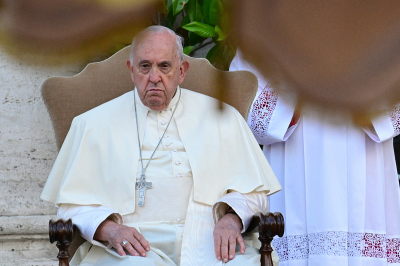Why I am not a Catholic

Speaking at the Leonine Forum in D.C. recently, I was asked a friendly but pointed question: “Why are you not a Catholic?” The questioner noted that in my talk I had expressed a love for the early Church Fathers, admiration for Thomas Aquinas, and an approach to ethics that resonated with John Paul II’s theology of the body.
It’s hard to answer such a question in brief compass at the end of a lecture. Many issues are important in my commitment to Reformed Protestantism: authority, salvation, the nature of the ministry, and the significance of sacraments are just a few of the more obvious. And while I am open to the criticism that Protestantism hasn’t given Mary her due, I believe the Catholic Church has given her a significance that is well beyond anything the Bible would countenance. But above all, at the current moment, Catholicism doesn’t appeal to me because of the man at the top: Pope Francis.
In my answer, I did try to be respectful of my audience, but I could not help but observe that the present pope seems to be nothing more than a liberal Protestant in a white papal robe. And as a Protestant, I am acutely aware of the damage such people do.
J. Gresham Machen, the Presbyterian controversialist who came to prominence in the Fundamentalist-Modernist controversy, argued that confessional Protestantism and Roman Catholicism were separated from liberal Christianity by, among other things, their commitment to supernaturalism. (Both agreed that the tomb was really empty on the third day.) In other words, the former were species of Christianity while the latter was a completely different religion.
I would update his critique today by saying that liberal Christianity need not necessarily deny the supernatural. It can also be characterized by a commitment to the supernatural that is nonetheless eclipsed by the natural. It has a concern for the immanent and no real use for the transcendent. Joel Osteen is a fine Protestant example of this: I see no reason to doubt he believes in the Resurrection, but the doctrine is at best merely instrumental to his vision of Christianity, a means toward achieving personal happiness and material success. The same applies to those, left and right, for whom party politics and influence in D.C. seem far more important than the rather less exciting realities of everyday Christian worship, catechesis, and discipleship.
Ironically, Pope Francis seems to fit into this Protestant liberal paradigm too. I have numerous friends who have swum the Tiber over the last decades, mainly for intellectual or aesthetic reasons. Ironically, the intellectual heft of historic Catholicism and its enviable aesthetic achievements seem to be the very things that the pope regards with indifference. And both of these seem to connect to that telltale sign that always presages trouble in Christian circles: a loss of the transcendent in favor of the immanent.
Hints of this appeared in the confusion surrounding the issue of blessings for individuals in same-sex relationships. A leader with both a strong grasp of Christian teaching and firm confidence that the teaching is true would never have presided over such a mess. Such a person, rooted in the transcendent, would always fear the wrath of God more than the op-eds of men. The latest example of this apparent pandering to matters of immanent importance is the pope’s decision to have a special pilgrimage for the LGBT community in the 2025 Jubilee Year, titled “Church: Home for All, LGBT+ Christians and Other Existential Frontiers.” This will involve a prayer vigil for LGBT Catholics on September 5 at the Church of the Gesù in Rome. They will then pass through the Holy Doors of St. Peter’s on September 6.
As an outsider, I have no way of knowing how this move connects to the internal politics of the Vatican and the Catholic Church. But one thing is clear: Here we have the Church allowing the categories of our immanent frame — categories that seem to stand at odds with Catholic teaching on sexuality and the human body — to drive the Jubilee celebration. However well-intentioned the pastoral motivation may be, the impression is one of either ignorance or contempt not merely for traditional Catholicism in particular but for orthodox Christianity in general.
Liberal Protestants are always a day late and a dollar short in their social teaching. In the 1960s, they dialogued with Marxists as Marxism started to fall apart under the weight of its own contradictions. Today, the Anglican Church moves to offer blessings for gay couples long after the wider world has affirmed gay marriage. Pope Francis keeps that tradition going, offering a pilgrimage to the LGBT community just as the L, the G, and the B are finding that, beyond a common foe in white heterosexual normativity, they are not really a unified “community” at all.
Confessional, orthodox Protestants should take no satisfaction in Rome’s increasing resemblance to the old enemy of liberal Protestantism. Rome still has the money and institutional weight to make a difference in these great struggles over what it means to be human. If Rome equivocates and falls on these issues, the world will become colder and harsher for all of us. To quote Elrond, our list of allies grows thin. And Pope Francis is not reversing that process.
Originally published at First Things.
Carl R. Trueman is a professor of biblical and religious studies at Grove City College. He is an esteemed church historian and previously served as the William E. Simon Fellow in Religion and Public Life at Princeton University. Trueman has authored or edited more than a dozen books, including The Rise and Triumpth of the Modern Self, The Creedal Imperative, Luther on the Christian Life, and Histories and Fallacies.




























